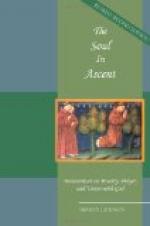BY
Amory H. Bradford, D.D.
Author of
“Spirit and life,”
“Heredity and Christian
problems”
“The growing revelation,”
“The age of
faith”
“Messages of the
masters,” Etc.
New York
the outlook company
1902
Copyright, 1902
By The Outlook Company
Mount Pleasant Press
J. Horace McFarland Company
Harrisburg, Pennsylvania
To The Memory of My Father
That each, who seems a
separate whole,
Should move
his rounds, and fusing all
The skirts
of self again, should fall
Remerging in the general Soul,
Is faith as vague as all unsweet:
Eternal
form shall still divide
The eternal
soul from all beside;
And I shall know him when
we meet._
—In Memoriam.
INTRODUCTION
The purpose of the following chapters will be evident to all who may care to peruse them. I have endeavored simply to read the soul of man with something of the care that one reads a book containing a message which he believes to be of importance.
While one class of scientists are seeking to explore the physical universe, another class, with equal care, are studying the human spirit, and, already, startling discoveries have been made. My work is in no sense new in kind, but it is such as one whose whole time is devoted to dealing with the inner life would naturally give to such a subject. It hardly needs to be added that my method is practical rather than speculative. I am more interested in helping the ascent of the soul than in accounting for its origin. In carrying out my plan I have considered the following subjects: The nature and genesis of the soul, its awakening to a consciousness of responsibility, the steps which it first takes on its upward pathway, the experience of moral failure, its second awakening, which is to an appreciation that the universe is on its side, the part of Christ in promoting its awakening, the sense of spiritual companionship by which it is ever attended, the discipline of struggle, and the nurture and culture best fitted to promote its growth. I have also sought to read some of the prophecies of the soul, and have found them all pointing toward a continuance of its being beyond the event called death, and toward the fullness of Christ as the goal of humanity. I have found a place for prayers for the departed even among Protestants of the strictest sects.
A study of the soul, like a study of history, inspires optimism. It is hard to believe that it could have been intended first for perfection and then for extinction. It is equally difficult to believe that any soul will, in the end, be “cast as rubbish to the void.”




